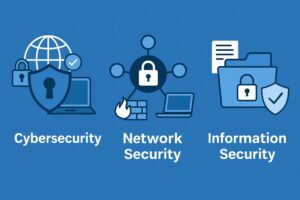In our more hi-tech world today, where everything revolves around digital-first technology, security has become more than just a technical term; it’s a skill for survival. Whether you are just starting as a student or already a busy professional managing critical systems, understanding cybersecurity, network security, and information security is no longer a matter of choice but necessity. Though their names sound similar, they refer to different domains of protecting our digital and data-driven lives.
What if you ever asked yourself, “What is the difference between cybersecurity and information security? Also, what is the difference between cybersecurity and network security? Well, this guide breaks it down in easy real-world terms. Upon finishing this guide, you will not only understand their differences but also know how they amalgamate to keep the online world safe.

-
Know Cybersecurity – The Whole Perspective
Cybersecurity is the umbrella term that covers everything about safeguarding the digital systems from threats posed in cyber terms. It includes guarding a whole city-not only its gates or treasures. It is a part of safeguarding devices, networks, software, and data from attacks by hacking, phishing, ransomware, etc.
For instance, when a bank prevents online fraud, when an e-commerce platform secures your payment details, or when your social media app has blocked logins from suspicious accounts, there is cybersecurity at work.
Cybersecurity is not as simple a concept as installing antivirus software. It goes as far as proactive monitoring, threat intelligence, risk assessments, and employee training in addition to that. Its domain is so expansive that it is why “network security” and “information security” are subordinately termed.
-
Network Security – The First Infection Point of Defense
Network security is purely a subdomain of cybersecurity that merely stresses its scope on the protection of the pathways through which data travels. If cybersecurity were a way of protecting a city, network security would entail lapses in that the city’s roads, bridges, or tunnels could not be crossed and thereby would keep intruders out.
Secured by firewalls to intrusion detection systems, by means of encryption and secure protocols, one would be able to shut out a hacker from your network. Even if the data is safe on your hard-disk, there is always a chance that this weak network could let them in.
Securing your office with Wi-Fi blocking unauthorized devices from connecting, or protecting cloud servers-all of these aspects fall under network security.
-
Information Security – The Keeper of the Crown Jewels
Information security is entirely about the protection of the data per se, be it stored in electronic or physical formats. In short, whereas cybersecurity guards the whole city, network security protects the roads, and information security protects the treasure itself inside.
It can concern sensitive company records, customer data, trade secrets, or even printed files classified as confidential. Information security ensures confidentiality, accuracy, and availability to authorized persons.
In fact, information security was already an industry long before cybersecurity became the trendy catchphrase. Locking a filing cabinet, encrypting sensitive emails, or controlling database access—all fall under information security.
What is the Difference Between Cybersecurity, Network Security, and Information Security?
While Cybersecurity, Network Security, and Information Security are closely related, they are not the same thing:
| Aspect | Cybersecurity | Network Security | Information Security |
| Scope | Protects everything in the digital space from cyber threats | Focuses only on securing networks and connections | Protects all forms of data (digital or physical) |
| Main Goal | Prevent cyberattacks and digital fraud | Block unauthorized access to networks | Maintain confidentiality, integrity, and availability of information |
| Examples | Antivirus, threat monitoring, cyber awareness training | Firewalls, VPNs, intrusion detection | Data encryption, password policies, document access control |
| Coverage | Broadest of all | A subfield of Cybersecurity | Overlaps with Cybersecurity but not limited to tech |
Even a solid cybersecurity strategy would remain incomplete without the incorporation of network security and information security. Here’s why:
- Network Security lets one keep the attackers out of the digital infrastructure.
- In contrast, information security ensures that even if they do gain entry, they are unable to exploit sensitive data.
- Together they make a layered defense that is far more difficult to break through.
Take, for instance, an online university. Cybersecurity takes care of patching and monitoring its systems, network security secures the student portal and Wi-Fi networks, while information security ensures that exam grades and personal records are safe.
Important Skills to Pursue a Career
Students and professionals aiming to enter in this industry should focus on building both technical and soft skills:
- Understanding network architecture and protocols (for Network Security);
- Learning data protection laws and compliance frameworks (for Information Security);
- Gaining proficiency in ethical hacking and penetration testing;
- Practicing incident response and recovery planning;
- Developing additional problem-solving and critical-thought skills.
Real-Life Examples
Cybersecurity:
IT applies AI-based threat detection to discover phishing on the employee email network.
Network Security:
A hospital secures its internal network with encrypted VPNs in order to protect its patient records.
Information Security:
A legal firm encrypts all case files and stores physical hard copies in rooms with restricted access.
This shows how each of them plays out in protecting different layers of digital and physical assets.
Next Trends
They shall all be fast-changing in the following decade:

- Cybersecurity will be powered by AI threat intelligence.
- Network security will move into the spotlight with 5G and IoT safeguarding.
- Information Security shall put in its spotlight data privacy regulations and quantum-safe encryption.
- As cyberperils become even more sophisticated, that will create a high demand for professionals that can straddle all three areas.
Also Read:
- 8 Importance of Cybersecurity in the Digital Age – Students & Professionals Effective Guide
- Cyber Attack – Common Cyberthreats You Must Know in 2025
- Cyber Security Terms You Must Know: 35+ Essentials for Every Learner
- Cyber Security Jobs: Top 15 High-Demand Roles in India for 2025
PW Skills Cybersecurity Course – Learn, Protect, and Lead
If you want real skills, you must begin with the skills demanded by today’s employers.
PW Skills offers a hands-on cybersecurity course for beginners to advanced-level applicants, teaching real-world tools, case studies, and hands-on labs. Learn from industry experts with real-world projects to start building a career in one of the most high-demand fields. Transform your curiosity into a professional skill set within a few months!
Cybersecurity Vs Network Security Vs Information Security FAQs
Can you have Cybersecurity without Network Security?
No. Without Network Security, your systems remain exposed to attackers, making Cybersecurity incomplete.
Is Information Security only about digital data?
No. It includes both digital and physical forms of information.
Which is better for a career—Cybersecurity or Network Security?
It depends on your interest. Cybersecurity is broader, while Network Security is more specialized.
How long does it take to learn Cybersecurity basics?
With focused study, you can grasp the basics in 3–6 months, but mastering it requires continuous learning.


